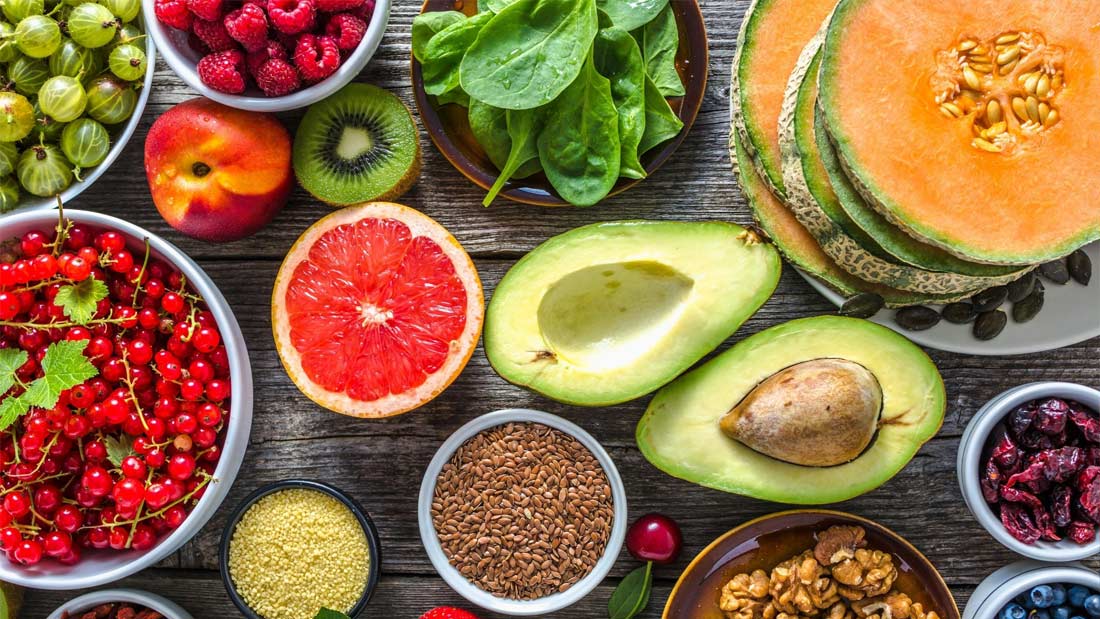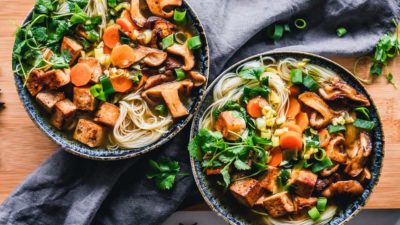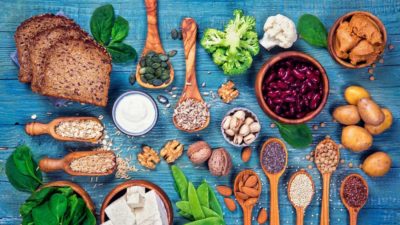Essential food groups

A healthy vegan diet that supports your athletic endeavours and boosts your performance consists of four essential food groups. They are crucial to your meal planning so make sure you don’t skip any of them!
What’s included:
- Fresh whole fruit or blended in a smoothie/shake
- Dried unsweetened fruit for snacks and desserts
- Fresh vegetables with meals, as a salad or blended in a smoothie
- Steamed, cooked or baked veggies – try not to overcook them so they retain some nutritional value
- Starchy vegetables – sweet potatoes, potatoes, pumpkins, squashes, root vegetables, corn
- At least one serving of dark green leafy vegetable daily – kale, broccoli, rocket, watercress, Brussel’s sprouts, bok choy, collard/spring/mustard greens, etc – they are exceptionally good for you and may even help prevent cancer
- If fresh produce is not an option or is too expensive, go for frozen fruit and veg as it retains most of the nutritional value
Why?
- Fruit and vegetables are the perfect source of healthy carbohydrates, fibre, antioxidants, flavonoids (antioxidant and health-promoting compounds), minerals (such as iron, calcium, magnesium, potassium), vitamins C, K and most of the B group
- They provide healthy energy and nutrients vital to muscle recovery and damage limitation
Avoid:
- Canned fruit and vegetables – they offer mostly just sugar
- Pasteurised and juices made from concentrate – same as above
- Sweetened or candied dried fruit
What’s included:
- Beans, peas, lentils, chickpeas – cooked from dried, out of a can, roasted and added to trail mix snacks
- Products made from these – burgers, patties, dips, soups, stews, hummus, falafel, lentil or bean pasta
- Soya and products made from it – edamame, tofu, tempeh, miso, mock meats, soya milk and yoghurts
- Peas – fresh or cooked, roasted as a snack
Why?
- Pulses are a great low-fat source of protein, complex carbohydrates, fibre, B group vitamins, many minerals (including iron, zinc and calcium), antioxidants and flavonoids
- They are the main source of protein in a vegan diet and provide healthy energy
Avoid:
- Undercooked beans – if they aren’t well cooked, they may cause digestive upset
What’s included:
- Wholemeal, wholegrain or whole wheat products – bread, pasta, noodles, tortillas
- Brown rice and other wholegrain varieties, such as wild or red rice
- Other whole grains – quinoa, buckwheat, barley, spelt, oats
- Oat-based products – muesli, granola, oat energy bars, power cookies, oat cakes etc. (but beware of lots of added sugar and fat – always check the ingredients)
- Wholegrain crispbreads and crackers
Why?
- Wholegrains are an amazing source of healthy, complex carbohydrates, protein (unlike refined grains such as white bread, biscuits or cornflakes), many minerals and vitamins (depending on the type of grain), and a big family of antioxidants
- They are an essential source of energy for us, help top-up our protein intake and aid post-training recovery
Avoid:
- Sugary and fatty products with some wholegrains in masquerading as healthy, such as flapjacks or sugary breakfast cereals
What’s included:
- Nuts and seeds, preferably unsalted
- All nuts are great but aim for a regular intake of almonds for calcium, walnuts for omega-3s and Brazil nuts for selenium
- Seeds – pumpkin seeds are great for zinc, sesame seeds for calcium, ground flaxseed, shelled hempseed and chia seeds for omega-3 fats
- Nut butters and tahini (sesame seed paste/butter) – used as a spread, nutrition booster in smoothies/shakes or to thicken sauces
Why?
- Nuts and seeds are excellent for protein, healthy unsaturated fats (apart from coconut), fibre, antioxidants, minerals including zinc and selenium, vitamin E and B group vitamins
- They are an excellent nutrition booster and can be eaten with and in-between meals
Avoid:
- Eating too many salted nuts as they can easily send your salt intake through the roof
- Relying on peanut butter too much – it can be a healthy addition to your diet but do eat other nuts and seeds too
“The biggest, strongest and longest-lived animals all eat PLANTS!”
Paul Kerton, vegan fitness and nutrition YouTuber Hench Herbivore
The food groups above provide almost every nutrient you need but there are three that you may need to supplement:
Vitamin B12
Vitamin B12 naturally comes from bacteria in the soil and both people and animals would traditionally have got it from eating unwashed plants. However, we not only wash vegetables before we eat them (and for good reasons) but food production is now so sanitised that most vegetables are washed in chlorine, or other sterilising solutions, so there’s not a trace of B12 left.
People are not generally aware that most farmed animals are given B12 supplements and this is how the vitamin eventually ends up in their flesh. So, the argument that meat is a natural source of B12 doesn’t really stack up as meat-eaters essentially consume B12 supplements recycled by the animals that were given them!
It is absolutely necessary that we have a reliable source of vitamin B12. We need it to make red blood cells, for a healthy heart and circulation, and it’s essential for the nervous system. It takes years to develop a B12 deficiency so on one hand, you don’t need to worry too much about not having taken B12 for a while, but on the other hand, you do need to pay attention to it as by the time symptoms develop, it’s usually serious.
To ensure adequate intake you should have at least 50 µg (micrograms) daily from supplements or fortified foods. The B12 used in both foods and supplements is produced commercially by growing bacterial cultures in large vats – and it’s always suitable for vegans.
There are two forms of B12 in supplements – cyanocobalamin (cheap) and methylcobalamin (expensive). Cyanocobalamin is the stable ‘inactive’ form of B12 and is used in supplements and to fortify foods and drinks. Once ingested, it’s activated in your stomach so it can be used by the body. Methylcobalamin is the ‘active’ form of vitamin B12 as it does not require any activation. It costs more and is not so stable. So which one to choose? Unless you’re a heavy smoker, have kidney failure or any other serious condition affecting your metabolism, cyanocobalamin – the cheap form of B12 – is perfectly fine. Intakes of up to 2,000 µg a day are safe and you can take either a lower dose daily or a higher dose a couple of times a week.
Vitamin D
We need vitamin D for healthy bones, teeth and muscles and it also performs other essential functions in our metabolism. It is produced in the skin when exposed to sunlight and this is the main source of vitamin D for most people. However, if you always use sun-cream, cover most of your skin or live in a country, like the UK, where we don’t get enough sunlight over the winter, you need a supplement, regardless of diet.
The UK Government now recommends that we all take a supplement from October to April and, if you protect your skin ferociously over the sunnier spring and summer months, you should take a supplement all year long. Otherwise, just 20 minutes a day of sunlight on the face and arms is all that is required for the body to manufacture sufficient vitamin D.
Fortified breakfast cereals, bread, plant milks and vegan margarines can be useful sources if exposure to sunlight is not practicable but it may not be enough. When it comes to supplements, there are two types and your body can use both but it’s advisable to check the source – vitamin D2 is always vegan but vitamin D3 can be of animal origin. Many vegan foods are fortified with vitamin D2 and labelled so but if not specified, especially on cereal products, vitamin D tends to be of animal origin. If you choose to supplement your diet, there’s a range of quality and affordable vegan supplements with vitamin D2. There also those made from algae or mushrooms that contain D3 and these are recommended if you need a higher dose. When deciding on your dosage, 10 µg per day is enough and you shouldn’t go above 25 µg.
Iodine
Iodine is a mineral necessary for thyroid function and helps to regulate how energy is produced and used in the body. The amount of iodine in plants depends upon the iodine content of the soil in/on which they are grown. The closer to the sea, the more iodine and therefore vegans can get enough from plant foods but there’s no guarantee. Seaweed, which of course grows in seawater, is always a good source and includes nori, laver, dulse and the kelp family (kombu, arame, wakame). But be warned – kelp absorbs far more than other seaweeds and you can get too much iodine from it. So, whilst seaweed consumption is encouraged, kelp should only be consumed sparingly.
It’s best to use a kelp supplement so you know exactly how much iodine you’re taking – it’s cheap, reliable and you don’t have to worry about taking too much. The recommended daily intake for iodine is 140 µg and intakes of up to 500 µg are considered safe. In many countries, iodised salt is commonly used to ensure iodine intake but it’s not the norm in the UK and too much salt can increase your blood pressure.
See Nutrition Basics for more information on foods and nutrients.








